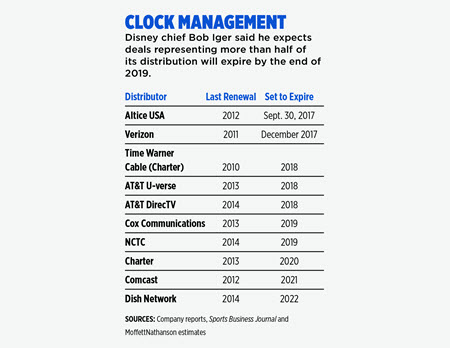Disney Braces for an Altice Blackout
The smarter way to stay on top of the multichannel video marketplace. Sign up below.
You are now subscribed
Your newsletter sign-up was successful

The Walt Disney Co., reeling from subscriber losses at its flagship cable network ESPN over the past three years, is facing the first real test of its true might in the next few weeks as it winds through carriage negotiations with Altice USA.
Altice USA’s Disney contracts for its New York-and New Jersey-area systems (the former Cablevision Systems) expire at the end of the month. So far, it appears as if talks are becoming contentious, with some analysts saying that Disney is pushing for an expansion of mandatory minimum subscriber counts for ESPN.
ESPN is also asking Altice to carry two college sports networks — the SEC Network and the yet-to-be-launched ACC Network — from conferences without teams in the New York metro area. It’s also calling for big carriage-fee increases for what Altice currently carries.
Precedent-Setting Deal
The Altice contract could set the template for future deals with Disney. Other top distributors are expected to be next in line: Verizon Communications’ carriage deal is expected to come up for renewal in December, followed by Charter Communications and AT&T’s U-verse and DirecTV in 2018.
Analysts are expecting Disney to assert itself in the upcoming negotiations, with Pivotal Research Group CEO and senior media and communications analyst Jeff Wlodarczak predicting the programmer will push hard for big fee increases and higher mandatory carriage minimums to offset its declining subscriber base. But the analyst was less sure if Disney would get what it asks for.
“I think the media guys are well on their way to killing the golden goose by being as aggressive as they have on raising pricing,” Wlodarczak said in an email message. “And let’s face it, the traditional TV experience is not that great [with] high prices and massive commercial loads. This is why people are leaving traditional pay TV — it is simply too expensive for an arguably increasingly unattractive experience.”
That said, Wlodarczak estimated that Disney would likely get fee increases that are a multiple of the inflation rate, most likely in the 10% or higher range.
BTIG media analyst Richard Greenfield estimated that Disney would seek double-digit rate increases for both ESPN and its ABC broadcast network, as well as carriage for college channels SEC Network and ACC Network. He also expected Disney to seek to increase penetration minimums in an effort to reclaim lost subscribers.
That could be a deal-breaker for most distributors, Greenfield wrote, because it would prevent them from creating smaller packages — so-called skinny bundles — of programming that don’t include ESPN.
But Disney seems prepared to play hardball with the smaller Altice USA. The renewal would only cover its New York-area systems, with about 2.5 million customers. Its Midwest customers, under the Suddenlink brand, would not be affected.
“[A]s we enter these negotiations, one that we’re in the middle of right now, we intend to use the strong hand that we have with the brands that we have as we negotiate these new deals and position us well going forward,” Disney chairman and CEO Bob Iger said at the Bank of America Merrill Lynch Media, Communications & Entertainment conference earlier this month.
Iger noted that deals representing about half of Disney’s distribution will come up for renewal by the end of 2019.
“And again, we think with ESPN, in particular, with Disney and with ABC, we’re well-positioned going into these discussions,” he said.
But Disney’s aggressive stance could backfire if Altice decides to let the networks go dark. Both Wlodarczak and Greenfield, in their respective notes, said they believed at least a temporary blackout of the channels is likely.
“We would not be surprised, especially if we are correct on raising the programming carriage minimums, if you see a public battle with Altice with an outside shot of at least a short-term carriage drop,” Wlodarczak wrote. “We believe these types of asks are likely the blueprint Disney (and frankly all other media players with leverage) will follow with future negotiations with distributors.”
Holding the Line
Altice has vowed to take a hard line on rising programming costs and has experience with blackouts. Its Suddenlink systems in the Midwest were without Viacom’s two dozen channels — including MTV, Comedy Central and Nickelodeon — for about three years over a carriage dispute. Most of those channels returned in August at terms amenable to both parties.
The last time Altice USA negotiated with ESPN, as Cablevision in 2012, ESPN was priced at about $5.04 per subscriber per month, according to Kagan. The price is expected to rise to $8.14 per subscriber per month in 2018 and to $9.50 by 2020. Cablevision also agreed in 2012 to carry more channels, including ESPN 3D, broadband service ESPN3 and Fusion TV, a joint venture of ABC News and Univision for a 24-hour English-language channel for Hispanics. Disney sold its stake in Fusion back to Univision in 2016.
Disney has been reeling since 2015, when it first revealed that ESPN had lost about 3 million subscribers. Since then, the sports leader has shed several million more customers, and programmers have consistently talked up a “sports-free” skinny bundle that would package several entertainment channels (minus ESPN). At the Goldman Sachs Communacopia conference earlier this month, Viacom CEO Bob Bakish predicted such a non-sports programming package would come by the end of the year.
The smarter way to stay on top of the multichannel video marketplace. Sign up below.
